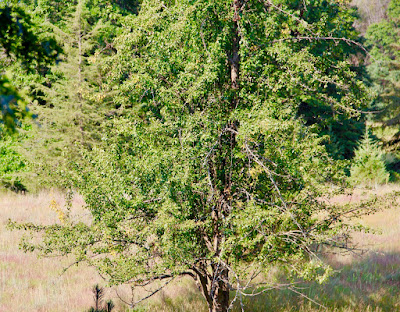With excellent assistance from the Better Half [BH], the mums are now planted along the north side of the drive. Some time in the next few days, I’ll wander off and see if I can find a couple of aster plants.
 |
| asters, still on the “To Do” list
Photo by J. Harrington
|
Once the mums were in the ground, the BH watered them and I proceeded, on my own, to pick up the trash along our stretch of country road, much of the litter had blown out the top hatch of one or more of the solid waste collection trucks that service the township. After that, I burned the latest batch of broken, dead branches brought down by recent storms. In that process, the sand burs and grasses previously mowed from along the road were consumed by fire (in the fire pit).
Tidying the place up has been aided and abetted by members of the local deer herd, one or more of whom have been consuming the bur oak acorns that were dropping onto the drive. This morning we caught a glimpse of one of the guilty parties, or an accomplice, in the field behind the house. Life around here would be vastly improved if whitetail deer added poison ivy to their favorite foods list.
All in all, I’ve reached a point where my middle-class upbringing, focused as it was on neat and orderly, is slowly yielding to a countrified emphasis on ecological function. Instead of cleaning all the oak leaf and pine needle mix before planting the mums, I left the mix there as mulch. There’s plenty of other places around the property I can gather leaves to feed brown material into the compost.
That’s it for now. Although not technically a chore, I baked another loaf of artisan sourdough bread this morning. For the first time ever, I think, the Better Half told me a loaf of my bread needed more salt. I’m going to go taste it for myself now. We’ll be back tomorrow, dog willing and the river don’t rise too much.
Mowing
Sleepy and suburban at dusk,I learn again the yard’sgeometry, edging around the gardenand the weedy knots of flowers, circlingtrees and shrubs, givinga wide berth to the berry patch,heavy and sprawled out of its bounds.Shoving such a machinearound a fairway of dandelions,it is easy to feel absurd.The average lawn, left aloneone hundred years, could becomea hardwood forest. An admirable project.Still I carry on, following week on weekthe same mowing pattern, cutting edges,almost sprinting the last narrow swaths.And tonight, as I mow overthe bushels of fallen peaches,sending pits soaring over the neighbors’ fences,seems hardly any different.But on one crooked march I walkacross the thin hidden holeto a yellowjacket hive. The blade pullsthem up from their deep sweet chamberjust as my bare legs go by.A bee lands heavily,all blunder and revenge, and the stingis a quick embrace and release,like the dared kid’s run and touchof a blind man. I’m blind nowwith the shock and pain of it,howling in a sprint toward the house,the mower flopped on its side, wild blade loosein the darkening air.Later,the motor sputtered quiet, starved by tilt,I’m back in the twilight,a half-dozen stings packed in wet tobacco,carrying a can of gasoline, a five-foot torch.The destruction is easy: shove canslow to entranceway lip, pullback and light torch, use torchto tip can. One low whump and it’s over.A few flaming drones flutter out and fall.Stragglers, late returners, cruisewide circles around the ruins.In the cool September night they flyor die. In the morning I finish my chores.All the way to winter the blackened holeremains. On Christmas Eve a lightlate snow covers it and allthe lawn’s other imperfections: crabgrasshummocks, high maple roots,the mushroom-laden fairy ring that defiesobliteration and appears every springmore visible than ever. Standingin the window, the scentof pine powerful around me,the snap of wood undoing itself in the stove,I wonder at this thin and coldcamouflage, falling,gradually falling over what has goneand grown before. And I hearthat other rattle and report, that enginedriven by another fire. I think of a goldthat is sweet and unguent, a goldthat is a blaze of years behind me.I hear wind in its regular passesblowing across the roof,feel in my legs a minute and icy tingling,as though I have stood too longin one place or made again another wrong step,as though the present itselfwere a kind of memory, coiled, waiting,dying to be seen from tomorrow.
********************************************
Thanks for visiting. Come again when you can.
Please be kind to each other while you can.













